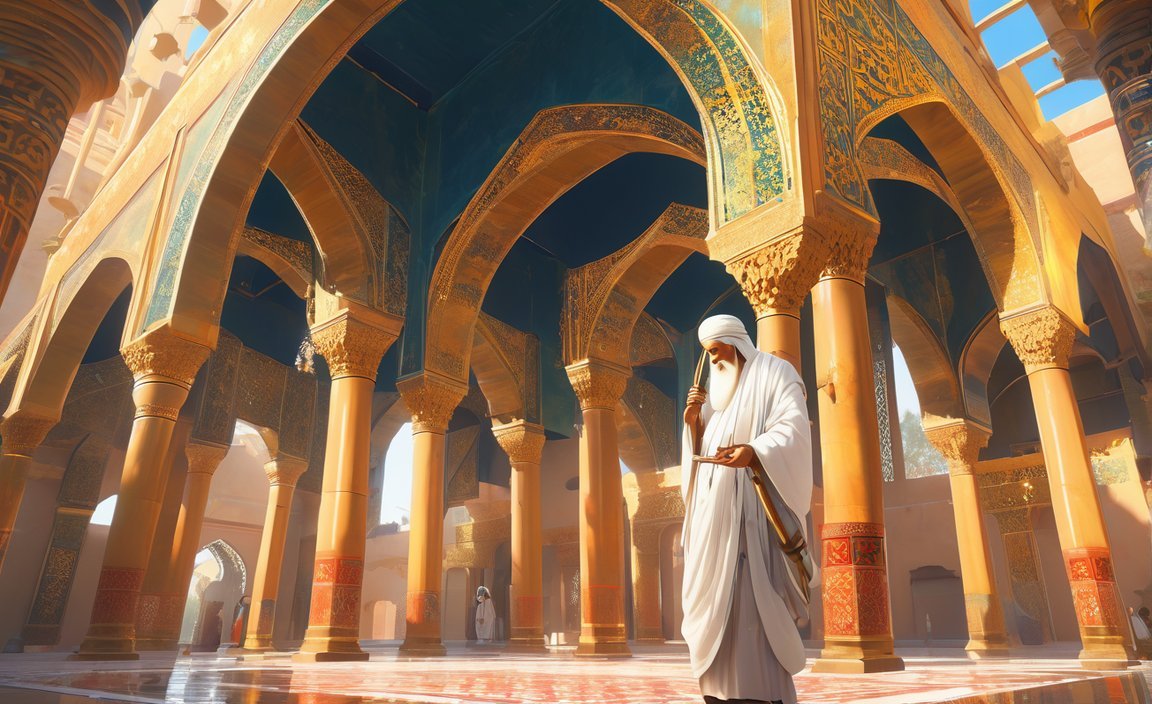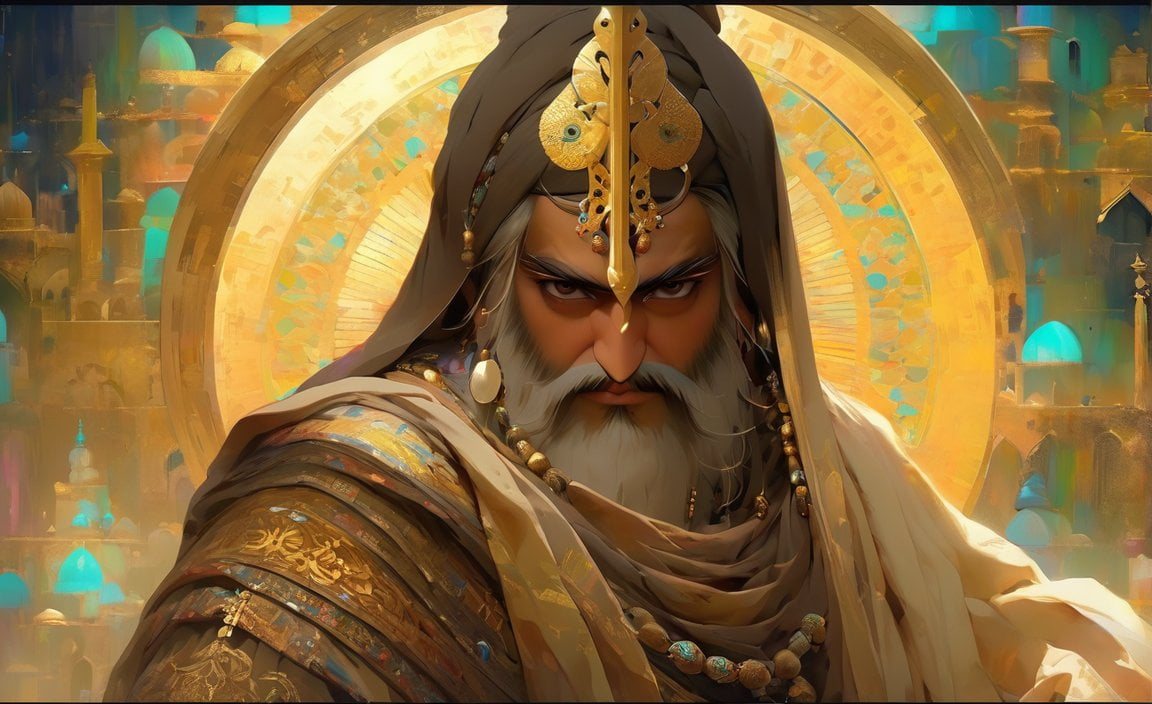The Impact of the Rightly Guided Caliphs: Unveiling Islamic History delves into the transformative era of the rightly guided caliphs, shedding light on their remarkable leadership and enduring contributions to the Islamic world. As an experienced historian and scholar with a profound fascination for Islamic history and theology, this article aims to bridge the gap between scholarly research and wider audiences, presenting a comprehensive exploration of the political, religious, and social impact of these eminent figures. Through meticulous analysis and a multidisciplinary approach, we unravel the complexities of this pivotal period, offering readers a clear and contextual understanding of the rightly guided caliphs’ remarkable achievements and the challenges they faced. Join us on this captivating journey as we unravel the rich tapestry of Islamic history.

Key Takeaways:
- The Rashidun caliphs were the first four successors of Prophet Muhammad in Sunni Islam.
- The caliphs are Abu Bakr, Umar, Uthman, and Ali.
- They are known as the rightly guided caliphs because they followed the Qur’an and the example of Muhammad.
- The Rashidun Caliphate they established is considered a model of righteous rule in Sunni Islam.
- The caliphate expanded Islam’s influence by conquering Persia, Syria, Armenia, Egypt, and Cyprus.
- They implemented social policies, such as creating a state treasury, building infrastructure, and providing welfare services.
- Challenges they faced included tensions among the caliphs and criticism from Shia Muslims.
- Sunni Muslims regard the Rashidun caliphs as models of righteous rule, while Shia Muslims have different views.
The Impact of the Rightly Guided Caliphs: Unveiling Islamic History
Introduction
The Era of the Rightly Guided Caliphs
The era of the rightly guided caliphs holds immense significance in the history of Islam. This period refers to the first four successors of Prophet Muhammad in Sunni Islam – Abu Bakr, Umar, Uthman, and Ali. They are known as the Rashidun caliphs due to their belief in following the Qur’an and the example of Muhammad in all aspects of their rule. Through their leadership, they established the Rashidun Caliphate, which is viewed as a model of righteous governance in Sunni Islam.
Expansion of Islam and Political Achievements
The reign of the rightly guided caliphs witnessed remarkable expansion of Islam beyond Arabia. Their conquests encompassed regions such as Persia, Syria, Armenia, Egypt, and Cyprus, spreading the message of Islam far and wide. This expansion was not merely territorial; it also marked the triumph of Islamic values and principles.
Furthermore, the Rashidun caliphs implemented various political measures that solidified their rule and laid the foundation for future Islamic empires. They established a state treasury to ensure financial stability, constructed roads and bridges to enhance infrastructure, and focused on civil welfare by constructing and repairing essential resources like wells and canals. These initiatives not only improved the quality of life for their subjects but also established a system of governance rooted in justice and social welfare.
Challenges and Criticisms
Despite their accomplishments, the rightly guided caliphs faced challenges that tested their leadership and unity. Disagreements and tensions emerged between the four caliphs, at times leading to divisions within the Muslim community. Shia Muslims, in particular, hold differing views and believe that the first three caliphs were usurpers, while considering Ali as the rightful successor to Prophet Muhammad. This schism between Sunni and Shia Muslims continues to influence the narrative surrounding the era of the rightly guided caliphs.
Enduring Legacy and Impact
The legacy of the rightly guided caliphs continues to shape Islamic history and theology. Sunni Muslims widely regard them as embodiments of righteous rule, respecting their accomplishments and drawing inspiration from their leadership. The principles established by the Rashidun caliphs, such as justice, consultation, and adherence to Islamic teachings, continue to guide Islamic governance and provide a benchmark for righteous leadership.
Their profound impact extends beyond political achievements. The Rashidun caliphs played a crucial role in preserving and codifying the teachings of Islam. Abu Bakr initiated the compilation of the Qur’an, ensuring its authenticity and preservation. Umar implemented administrative reforms, which laid the groundwork for future governance systems. Uthman standardized the text of the Qur’an, further establishing its authority. Ali, known for his intellectual contributions and legal acumen, played a vital role in the development of Islamic jurisprudence.
Conclusion
The Blackfoot Tribe is known for their unique and fascinating clothing traditions. If you want to explore more about Blackfoot Tribe clothing, click here.
In Inca society, the Sapa Inca held a revered position and served as the leader. Curious to learn more about the role of the Sapa Inca? Click here.
Have you ever wondered where Archimedes, the brilliant mathematician, was laid to rest? Discover more about Archimedes’ grave here.
Contributions and Challenges Faced by Umar ibn al-Khattab as the Second Caliph
Umar ibn al-Khattab, the second caliph of Islam, left an indelible mark on the growth and development of the Islamic state. His contributions were instrumental in shaping the governance, justice system, and welfare programs that continue to inspire Muslims around the world today.
Expanding the Islamic State:
Umar possessed exceptional military and strategic skills, which allowed him to expand the Islamic state beyond Arabia’s borders. Through his conquests of Mesopotamia and Syria, Umar transformed the fledgling Arabian principality into a formidable world power. [3. Contributions and challenges faced by Umar ibn al-Khattab as the second caliph]
Economic Reforms and Administrative Innovations:
During his reign, Umar introduced significant economic reforms that contributed to the stability and prosperity of the Islamic state. He established the public treasury, known as Bayt al-Mal, which centralized and managed state finances. This institution played a crucial role in ensuring equitable distribution of wealth and supporting welfare programs for the poor and needy. Umar also standardized the currency, established a postal system, and conducted a census, all of which bolstered the state’s administration. [3. Contributions and challenges faced by Umar ibn al-Khattab as the second caliph]
Emphasis on Justice and Rule of Law:
Umar’s commitment to justice and upholding the rule of law earned him the title “Al-Farooq,” meaning the one who distinguishes between right and wrong. He implemented a fair and efficient judicial system, establishing courts where disputes were resolved according to Islamic principles. Umar ensured justice was accessible to all, regardless of wealth or social status, which significantly contributed to the cohesion and stability of the Islamic state. [3. Contributions and challenges faced by Umar ibn al-Khattab as the second caliph]
Challenges and Opposition:
Like any leader, Umar faced numerous challenges and opposition during his rule. He encountered rebellion and assassination attempts, which posed significant threats to his leadership and the stability of the Islamic state. Furthermore, internal conflicts within the Muslim community arose, particularly regarding the issue of succession after Umar’s death. These challenges tested Umar’s leadership and decision-making abilities, yet he navigated through them with resilience and determination. [3. Contributions and challenges faced by Umar ibn al-Khattab as the second caliph]
Legacy and Enduring Impact:
Umar ibn al-Khattab’s contributions as the second caliph of Islam continue to shape Islamic history and theology. His achievements, from expanding the Islamic state to implementing economic reforms and upholding justice, have been extensively studied and celebrated. The principles of justice, consultation, and adherence to Islamic teachings that Umar exemplified continue to guide Islamic governance and serve as an inspiration for generations to come. Umar’s leadership and vision have left a lasting legacy and an enduring impact on the Islamic world. [3. Contributions and challenges faced by Umar ibn al-Khattab as the second caliph]
Key Takeaways:
- Umar ibn al-Khattab played a crucial role in expanding the Islamic state beyond Arabian borders through his military conquests.
- He introduced significant economic reforms, including the establishment of the Bayt al-Mal (public treasury) and welfare programs for the poor and needy.
- Umar implemented a fair and efficient judicial system, emphasizing justice and upholding the rule of law.
- He faced challenges such as rebellion, assassination attempts, and internal conflicts within the Muslim community.
- Umar’s contributions and leadership continue to shape Islamic history and theology, with his principles guiding Islamic governance.
Uthman ibn Affan as the Third Caliph: Controversies and Achievements
As the third caliph to rule after the death of Prophet Muhammad, Uthman ibn Affan played a significant role in shaping early Islamic history. His reign was marked by both achievements and controversies, leaving a lasting impact on the Islamic world. Let’s explore the key aspects of Uthman’s caliphate.
Uthman’s Administrative Centralization and Quranic Standardization
One of Uthman’s major achievements was his centralization of the caliphate’s administration. He sought to establish a unified system of governance by appointing governors to oversee different regions of the expanding Islamic state. This administrative structure helped to streamline decision-making and maintain stable governance.
Additionally, Uthman played a crucial role in standardizing the Quran. Prior to his caliphate, different versions of the Quran existed in various regions, leading to potential variations in the text. Uthman recognized the need for a universally accepted version and ordered the compilation of a standardized Quran. This initiative ensured the preservation and dissemination of Islam’s sacred text in a consistent form.
Controversies and Opposition
However, Uthman’s caliphate was not without controversies and opposition. During the process of selecting him as caliph, struggles of succession emerged within the Islamic community. These internal divisions and disagreements tainted the legitimacy of Uthman’s rule in the eyes of some.
Towards the end of his reign, Uthman faced armed revolts and political opposition from within the Muslim community. Dissatisfaction with his administration, allegations of favoritism towards his relatives, and economic grievances contributed to the unrest. Unfortunately, these tensions culminated in Uthman’s assassination on June 17, 656, in Medina.
The Impact of Uthman’s Caliphate
Uthman’s caliphate marked a turning point in Islamic history. His achievements in administrative centralization and Quranic standardization contributed to the stability and preservation of Islam. However, his controversies and subsequent assassination sparked religious and political conflicts within the Islamic community.
The controversies surrounding Uthman’s reign emphasize the complexities and challenges inherent in the early caliphate. The power struggles and internal divisions witnessed during this period illustrate the diverse perspectives and interests present within the Muslim community.
Despite the controversies, Uthman’s contributions cannot be disregarded. His administrative skills and efforts to spread Islam left a lasting impact, shaping the future trajectory of the Islamic world.
Key Takeaways:
- Uthman ibn Affan, the third caliph, centralized the administration of the caliphate and standardized the Quran.
- He faced controversies and opposition, including struggles of succession and armed revolts.
- Uthman’s achievements in administrative centralization and Quranic standardization left a lasting impact on the Islamic world.
- However, his controversies and subsequent assassination sparked religious and political conflicts within the Muslim community.
Ali ibn Abi Talib as the fourth caliph: conflicts and legacy
Key Takeaways:
– Ali ibn Abi Talib, also known as Ali al-Murtaḍā, was the cousin and son-in-law of Prophet Muhammad, and the fourth caliph of Islam.
– Ali’s life can be divided into distinct periods separated by major events, as recorded in Sunni and Shiʿi texts.
– Both Sunni and Shiʿi sources confirm important events in Ali’s life, including his acceptance of Muhammad’s call to Islam and his role in the Battle of Badr.
– Ali was elected as the fourth caliph after the assassination of the third caliph Uthman, amidst growing pressure and division within the Muslim community.
– Ali’s reign as caliph was marked by conflicts, including the Battle of The Camel and the Battle of Siffin, which became significant events in Islamic history.
– Ali is recognized as the first Shia Imam and the fourth Rashidun caliph within the Islamic tradition.
Ali ibn Abi Talib, the fourth caliph of Islam, holds a revered position in the hearts and minds of Muslims around the world. His legacy is intertwined with the early history of Islam and the challenges faced by the Muslim community during his reign. Let’s delve into the conflicts and lasting impact of Ali ibn Abi Talib as the fourth caliph.
Ali’s journey began as the cousin and son-in-law of Prophet Muhammad, playing an integral role in the migration of Muslims from Mecca to Medina. He accepted Muhammad’s call to Islam and stood alongside him in critical battles, including the renowned Battle of Badr. Sunni and Shiʿi sources corroborate the significance of these events in Ali’s life, emphasizing his unwavering commitment to the faith and his courage in defending it.
The political landscape shifted after the assassination of the third caliph, Uthman. Amidst growing pressure and division within the Muslim community, Ali was elected as the fourth caliph. However, his reign faced numerous conflicts that shaped Islamic history. Two notable battles, the Battle of The Camel and the Battle of Siffin, emerged as pivotal moments during Ali’s caliphate.
The Battle of The Camel erupted due to tensions and disagreements regarding the caliphate’s legitimacy, involving Aisha, the Prophet Muhammad’s widow, and prominent companions. This conflict resulted in bloodshed and underscored the challenges Ali faced in maintaining unity among the Muslim community. The Battle of Siffin followed, further exacerbating divisions, primarily due to a power struggle between Ali and Muawiyah, the governor of Syria. This battle not only left a lasting impact on Islamic history but also contributed to the development of the Sunni-Shiʿi split.
Ali’s legacy extends beyond his role as the fourth caliph. He is recognized as the first Shia Imam, representing a significant branch within Islam. His contributions to Islamic jurisprudence and knowledge are also highly regarded. The teachings and principles attributed to Ali continue to inspire and guide millions of Muslims worldwide.
Ali ibn Abi Talib’s position as the fourth caliph was marked by conflicts that significantly influenced the course of Islamic history. The Battle of The Camel and the Battle of Siffin stand as reminders of the challenges faced during his caliphate. Ali’s role as the first Shia Imam and his contributions to Islamic thought and law further solidify his enduring legacy.
Citations:
- Britannica: Ali | Biography, History, & Facts. [^1^]
- Al-Islam.org: Ali ibn Abi Talib, the Fourth Caliph of the Muslims. [^2^]

FAQ
Q1: Who are the rightly guided caliphs in Islamic history?
A1: The rightly guided caliphs refer to the first four successors of Prophet Muhammad in Sunni Islam. They are Abu Bakr, Umar, Uthman, and Ali.
Q2: Why are the Rashidun caliphs called the “rightly guided” caliphs?
A2: The Rashidun caliphs are called the “rightly guided” caliphs because they are believed to have followed the Qur’an and the example of Prophet Muhammad in all things. They are seen as models of righteous rule in Sunni Islam.
Q3: What contributions did the rightly guided caliphs make to the Islamic world?
A3: The rightly guided caliphs made significant contributions to the Islamic world. They established the Rashidun Caliphate, greatly expanded Islam beyond Arabia, and implemented social policies such as constructing roads and bridges and providing civil welfare.
Q4: What challenges did the rightly guided caliphs face during their rule?
A4: The rightly guided caliphs faced various challenges during their rule, including disagreements and tensions between the four caliphs and criticism from Shia Muslims who see the first three as usurpers. They also faced rebellion, assassination attempts, and political opposition from within the Muslim community.
Q5: How are the rightly guided caliphs viewed by different branches of Islam?
A5: Sunni Muslims view the rightly guided caliphs as models of righteous rule, while Shia Muslims hold differing views. Shia Muslims recognize Ali as the first Shia Imam and the fourth Rashidun caliph, while Sunni Muslims consider the first four caliphs as the rightly guided successors of Prophet Muhammad.
- China II Review: Delicious Food & Speedy Service - April 17, 2025
- Understand Virginia’s Flag: History & Debate - April 17, 2025
- Explore Long Island’s Map: Unique Regions & Insights - April 17, 2025
















